

Indigenous Peoples Permanent Sovereignty Over Natural Resources. Lecture by Professor Dr.
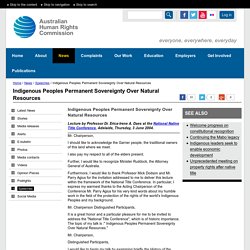
Erica-Irene A. Daes at the National Native Title Conference, Adelaide, Thursday, 3 June 2004. Mr. Chairperson, I should like to acknowledge the Garner people, the traditional owners of this land where we meet. Indigenous Peoples - Lands, Territories & Natural Resources. Indigenous people and the crisis over land and resources. Indigenous groups are now represented globally by a range of international organisations – the United Nations Permanent Forum on Indigenous Issues (UNPFII), the Assembly of First Nations, Survival International, the World Council of Indigenous Peoples, Indigenous Environmental Network – and by many national organisations, along with a host of declarations on indigenous issues by UN agencies and international groups.
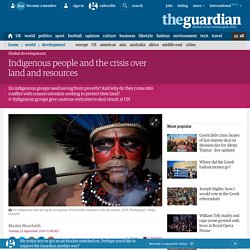
Acceptance in Latin American nation states of a multicultural citizenship which is inclusive of indigenous groups has become standard practice on the statute books. A range of rights has been accorded by Central American governments to their indigenous populations. In most cases the recognition is only on paper. The Honduran government, for instance, sidesteps its legal obligations to indigenous populations and their communal land rights by legislating in favour of individual ownership, which directly undermines the principle of communal ownership in indigenous territories.
Indigenous natural resource management in northern Australia - CSIRO. Indigenous people have a major stake in the sustainable management of northern Australia’s terrestrial, freshwater and marine ecosystems.
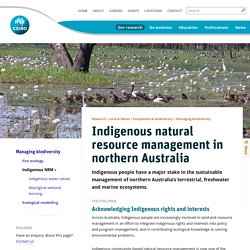
Acknowledging Indigenous rights and interests Across Australia, Indigenous people are increasingly involved in land and resource management in an effort to integrate Indigenous rights and interests into policy and program management, and in contributing ecological knowledge to solving environmental problems. Indigenous community-based natural resource management is now one of the fastest growing sectors in Australia’s environmental management system. In northern Australia, Indigenous people have a major part to play in the sustainable management of the region’s terrestrial, freshwater and marine ecosystems. Working with Indigenous communities across the north. The Dark Side of Natural Resources. Global Connections . Natural Resources. The history of cotton in Egypt is a good example of how Europeans have exploited the region's agricultural resources.
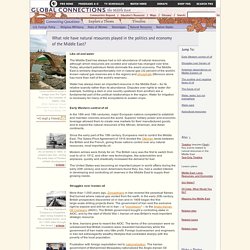
During the American Civil War, American cotton grew scarce, and Egyptian cotton became increasingly important to England. Agreements signed in 1880 with European powers meant that no tariffs were applied to cotton. This meant that more and more farmable land was used to grow cotton instead of food crops. Most of the profits were taken by Egypt's small ruling elite and the Europeans. GlobalMiningIndustry-Overview.pdf. Negotiating natural resources for peace: Ownership, control and wealth-sharing. Understanding social and economic influences on natural resource management decisions. Understanding social and economic influences on natural resource management decisions Jeanette Stanley and Beth Clouston Abstract.
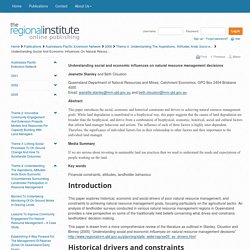
Towards sustainable development ... WEF Future Availability Natural Resources Report 2014. Community-rights-initiative-overview. Food and Agriculture Organization of the United Nations. Overview Persistently high levels of hunger and malnutrition – 795 million chronically hungry people in the world in 2014–2016 – and unsustainable human activity on the earth’s carrying capacity present a major challenge for agriculture.
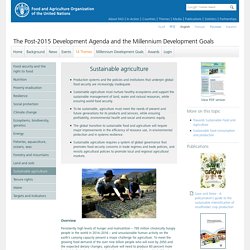
To meet the growing food demand of the over nine billion people who will exist by 2050 and the expected dietary changes, agriculture will need to produce 60 percent more food globally in the same period. A safe and just space for humanity. Overconsumption? Our use of the world's natural resources. Consequences of Depletion of Natural Resources - The World Counts. TheWorldCounts, 22 March, 2014 Are we using up more than what is available?
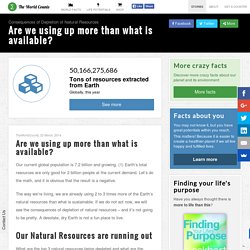
Our current global population is 7.2 billion and growing. (1) Earth’s total resources are only good for 2 billion people at the current demand. Let’s do the math, and it is obvious that the result is a negative. The way we’re living, we are already using 2 to 3 times more of the Earth’s natural resources than what is sustainable. As World’s Population Booms, Will Its Resources Be Enough for Us? There are more than 7 billion people on Earth now, and roughly one in eight of us doesn't have enough to eat.
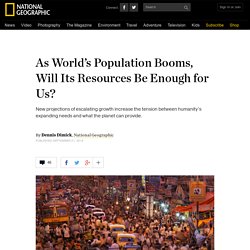
The question of how many people the Earth can support is a long-standing one that becomes more intense as the world's population—and our use of natural resources—keeps booming. This week, two conflicting projections of the world's future population were released. As National Geographic's Rob Kunzig writes here, a new United Nations and University of Washington study in the journal Science says it's highly likely we'll see 9.6 billion Earthlings by 2050, and up to 11 billion or more by 2100. These researchers used a new "probabalistic" statistical method that establishes a specific range of uncertainty around their results. Natural resources. Global Fight for Natural Resources 'Has Only Just Begun'
The global battle for natural resources — from food and water to energy and precious metals — is only beginning, and will intensify to proportions that could mean enormous upheavals for every country, leading academics and business figures told a conference in Oxford on Thursday.
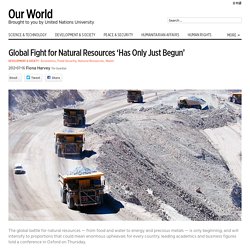
Sir David King, former chief scientific adviser to the United Kingdom’s (UK) government, who convened the two-day Resource 2012 conference, told the Guardian: “We are nowhere near realising the full impact of this yet. We have seen the first indications — rising food prices, pressure on water supplies, a land grab by some countries for mining rights and fertile agricultural land, and rising prices for energy and for key resources [such as] metals. But we need to do far more to deal with these problems before they become even more acute, and we are not doing enough yet.” But this is rapidly changing. Combating Poverty through Better Use of Natural Resources: IASS, IFAD and Partners Publish New Study. Natural resources are coming under increasing pressure in the face of climate change and growing global demand for raw materials.
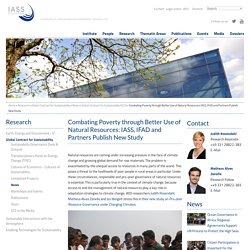
The problem is exacerbated by the unequal access to resources in many parts of the world. This poses a threat to the livelihoods of poor people in rural areas in particular. Under these circumstances, responsible and pro-poor governance of natural resources is essential. This is particularly true in the context of climate change, because access to and the management of natural resources play a key role in adaptation strategies to climate change.
Global resources stock check. As the world’s population soars, so does its consumption, and as a result we are stretching many of our natural resources to their limits. Of course, the assumption is that human ingenuity and market forces will prevent supplies from running out: we could create better or cheaper extraction methods, recycle materials, find alternatives to non-renewable sources, or reduce consumption. The hope is that talks at the Rio+20 Earth summit will help to steer the world economy on a more sustainable path. But the clock is already ticking, and if the unthinkable happens and we fail to correct current trends, then when can we expect our most valuable resources to run out? Environmental Policy and Natural Resources Management: Deutsches Institut für Entwicklungspolitik.
Resource Efficiency. Ensuring sufficient water, food, energy, and other natural resources for a world population of nine billion in 2050, while maintaining the quality of the environment, preventing climate change and reducing further loss of biodiversity. This is a global challenge. The Netherlands is participating in international forums for the sustainable use of natural resources, both in the context of the EU and in that of the United Nations. Demand for raw materials continues to increase with population growth, economic prosperity, and globalisation; it is expected to grow fourfold in the coming 40 years. Natural Resources Reports. Energy and natural resources. What is 'natural resource management'? Have you heard of natural resource management (NRM)? Natural resource management is the taking care of natural resources such as land, water, marine and biological systems, with a particular focus on how the management affects the quality of life for both present and future generations.
It’s about the long-term implications of actions - thinking about the future and not just about now. For primary producers, natural resource management means taking into account the climate, soils, water, vegetation and organisms when making decisions about the land they manage. The goal is sustainability - balancing social (people and communities), economic (money and jobs) and environmental (land, water, air and living things) factors to make sure that our children and grandchildren can equally benefit from our natural resources. Natural resources: definitions, trade patterns & globalization.